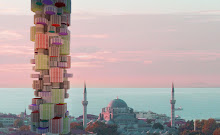 Another book on Africa recently caught my attention much in the same way Dambisa Moyo's book "Dead Aid" did. Written by Uganda-born Columbia University professor Mahmood Mamdani, this book titled "Saviors and Survivors: Darfur, Politics and the War on Terror," is extremely critical of humanitarian and human rights organizations and their current role in Darfur. What fascinated me about Mamdani's argument was that it challenged my blind assumptions about the roles and motives of humanitarian and human rights organizations located predominantly in the West.
Another book on Africa recently caught my attention much in the same way Dambisa Moyo's book "Dead Aid" did. Written by Uganda-born Columbia University professor Mahmood Mamdani, this book titled "Saviors and Survivors: Darfur, Politics and the War on Terror," is extremely critical of humanitarian and human rights organizations and their current role in Darfur. What fascinated me about Mamdani's argument was that it challenged my blind assumptions about the roles and motives of humanitarian and human rights organizations located predominantly in the West.
Since violence broke out in Darfur 6 years ago an approximate 300,000 people have died and more than 2.5 million have been forced out of their homes. While there are obviously many parties who are responsible for the violence and chaos, humanitarian organizations and human rights institutions have not been lumped into the group of perpetrators - until now. Mamdani presents that recent shifts in international affairs have eroded a state's sovereign rights (and a citizen's rights) in favor of humanitarian norms. Since the Cold War ended, there is growing consensus that a government cannot use its sovereignty to commit atrocities against its own people. International war crimes tribunals were set up for Rwanda and the former Yugoslavia. Then in 2002, the International Criminal Courts (ICC) was established prosecute individuals for war crimes. In 2006, 150 head of states at the United Nations endorsed the belief that the international community is responsible for the protection of vulnerable populations. While undoubtedly these efforts seem noble and just, Mamdani warns that this new world humanitarian order has its own pitfalls and dangers. Instead of being seen as citizens with rights, local populations are reduced to wards of the international community with the potential of losing their own voice in directing the course in their own lives. Mamdani also views these new humanitarian/human rights efforts and organizations as the powerful meddling in the lives and affairs of the less powerful. At an extreme, he sees them as a new kind of colonizer - where the respective interests of these organizations and institutions primarily based in the west determine the fate of a country's people.
While he agrees that those who perpetrated this violence must be held accountable, when and how he says, cannot be decided solely by the ICC prosecutor. He cites South Africa as an example of a country who chose a different path to achieve justice with the Truth and Reconciliation Commission. If Mandela chose to prosecute those responsible for upholding the apartheid regime in the 1990's, there may not have been such a peaceful settlement and smooth transition of government.

Mamdani has a valid argument here. Local methods of dealing with transitional justice that are not always understood by the West are often ignored. Decisions are then made and 'justice' is meted out without the consultation of the local population. But then whose justice is it? Mamdani claims that many of these western organizations focus too much on the perpetrators and a rhetoric of demonization and not on the issues that caused the violence. In so many of these conflicts, the perpetrators, he argues are constantly shifting. Additionally, without building up local mechanisms and institutions, local populations will always be unable to fight for justice and defend themselves.
Another significant issue raised by Mamdani is the west's laser focus on the crisis on Darfur, while turning a blind eye to what maybe considered much larger human catastrophes. Since violence broke out in Darfur, 200,000 to 400,000 people have been killed, (which is no small number and should not be dismissed) however, during this time in the Democratic Republic of the Congo 4.5 million people have been killed. According to Mamdani, Uganda and Rwanda both have army proxies in the Congo and since both these countries are U.S. allies, the world stays silent. Uganda, a militarized security state, whose government has carried out a campaign of anti-civilian violence in the north receives only mild admonishment. The ICC that purports to represent universal justice acknowledges that for "nineteen years the people of northern Uganda have been killed, abducted, enslaved and raped," but the blame only falls on the rebel Lord's Resistance Army (LRA). Meanwhile the Ugandan government continues their war on their own citizens spilling into surrounding countries unscathed.
Mamdani argues that western governments and institutions self-servingly divide Africa into states that are favored by the west and those countries tend to be labelled human rights protectors, allies in the War on Terror while others are labelled human rights violators, terrorist sponsors, deserving the full force of international coercion.
Mamdani has raised valid concerns as to the global power structure and how that can seep and stain seemingly honorable efforts like the promotion of human rights and justice, however, according to the Financial Times, to prove his point, Mamdani is at times prone to hyperbole and occasional errors and half truths. While his analysis of the omnipotence of the "Save Darfur" organization may perhaps be somewhat exaggerated, he is justified in questioning why not one penny of the millions of dollars raised by this organization ever goes to sustaining the life of a Darfurian refugee. Ultimately, in a world of power struggles, back room politicking, no global organization can be free from influence unfortunately. Western organizations would benefit from a closer reciprocal relationship with local populations when defining their own goals and aims and the context surrounding their intervention. And while he criticizes western governments and organizations for failing to appreciate the nuances in Sudan's history and development, he too falls prey to that which he criticizes. He lumps all western governments and institutions together as huge power hungry monolith working together in chorus without dissent. Many of these institutions like the ICC are new global structures that are constantly being studied to be made more effective. And undoubtedly, like the United Nations, in an imperfect world, any international organization will be often forced to delicately balance the whims and input of numerous countries - often the more powerful. When countries in the West are so often in limbo between apathy and action in an humanitarian crisis - I think Mamdani's efforts to raise greater awareness behind motivations for intervention or not is an important one.






























No comments:
Post a Comment